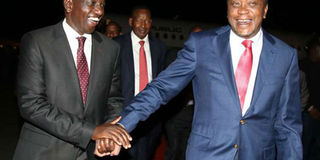Post-ICC, Jubilee has a chance to steady ship: Will it take it?

President Uhuru Kenyatta is received by the Deputy President William Ruto on his arrival at Jomo Kenyatta International Airport from a State Visit in France and Germany on April 9,2016. PHOTO | PSCU
What you need to know:
- It’s true many dirty tricks were undoubtedly deployed to end the cases, as has been documented in The Hague.
- The way the state mobilised resources to discredit the ICC and marshal the continent’s united leadership to trigger the collapse of the cases will no doubt have shocked the ICC’s leadership.
Let’s face it. The decision rendered by the judges in The Hague on Tuesday represented a stunning victory for the Kenyan elite and the state.
It was not a victory for the people. Kenyans were not on trial and this was a game between the Kenyan elite ranged against a powerful international institution.
Students of foreign policy and international affairs will have plenty to chew on in the matter of Uhuru Muigai Kenyatta, William Samoei Ruto vs Luis Moreno-Ocampo, Fatou Bensouda and the International Criminal Court.
It’s true many dirty tricks were undoubtedly deployed to end the cases, as has been documented in The Hague.
But the ICC has also learned a bitter lesson from its debacle. It completely underestimated the Kenyan elite.
It assumed the case in Kenya would be a breeze in the park like those in the DRC, Sudan or northern Uganda but it couldn’t have been more wrong.
The way the state mobilised resources, locally and abroad, to discredit the institution and marshal the continent’s united leadership to trigger the collapse of the cases will no doubt have shocked the ICC’s leadership and probably could lead to the institution being strengthened by the experience.
If little Kenya could embarrass the institution in such fashion, how will it handle its rumoured planned action over crimes committed in the Israeli and Palestinian territories?
In all this, the victims have suffered twice over, caught between a cynical state which would stop at nothing to have its way, and an incompetent prosecution team.
But there might be a glimmer of hope for Kenya in all this. The Jubilee administration has undoubtedly carried the day.
Its chances of re-election are considerably enhanced. Its sheen of illegitimacy has been (partially) rolled back because the leadership did not win an acquittal.
Can it take advantage and begin the job of reuniting the country and governing in a way that brings the nation closer together?
In their first three years in office, President Kenyatta and Deputy President Ruto have acted as though the election never ended. The constitution has been regarded as a mere nuisance.
RUTHLESSLY TARGETTED
Civil society has been ruthlessly targeted. The judiciary has been weakened, not least by the insertion into the crucial Judicial Service Commission of individuals who wear their partisanship on their sleeve. (One shudders to imagine how the replacement process of the current incorruptible Chief Justice will unfold).
The media has been treated as an enemy of the state. Targeted with an array of artillery, ranging from the withdrawal of advertising, to online smears and more overt intimidation, these are the toughest times for the press since the 1990s.
No institution outside the state still enjoys the power it did in the Kibaki-Raila years. Just ask the teachers union which was completely cut to size last year.
Can Jubilee, now that it no longer has a cloud hanging over its head, bring back the rational, tempered, judicious leadership that the 2010 constitution demanded?
Can we have a gentler leadership that seeks to accommodate all Kenyans rather than seeming to delight in excluding those seen as coming from opposition zones?
Above all, the leadership should find a way to acknowledge the violence and upheaval that occurred in 2007 and the terrible human cost it inflicted.
I personally supported the discharge of Ruto and Joshua arap Sang from The Hague. It would have been a travesty to lay all the crimes that occurred in so many parts of the country on the shoulders of two men.
That would have made Kenya an unwilling experiment of the capacity of criminal justice to deliver healing and reconciliation in the context of a conflict that had deep roots.
But now that the leadership has been cleared from The Hague, it should realise its historic responsibility to ensure that such crimes never occur again.
Mr Ruto has shown the right sense of humility in the days after the court’s decision. Let’s hope that lasts.
But whether it is by approaching elders across the country to frankly discuss the violence and its roots or by calling a national conference to discuss national cohesion or, better still, building a memorial to the victims as the Rwandans have, Jubilee would be wise not to take this as a moment of celebration after such a bad period in Kenyan history.
Kenya has had many opportunities to renew itself and achieve a better, more cohesive union.
The Jubilee Duo, in overcoming undoubtedly the greatest challenge of their lives, now have the chance not to waste this crisis by bringing the nation together and by governing in a way that goes beyond their us vs them campaign platform.





